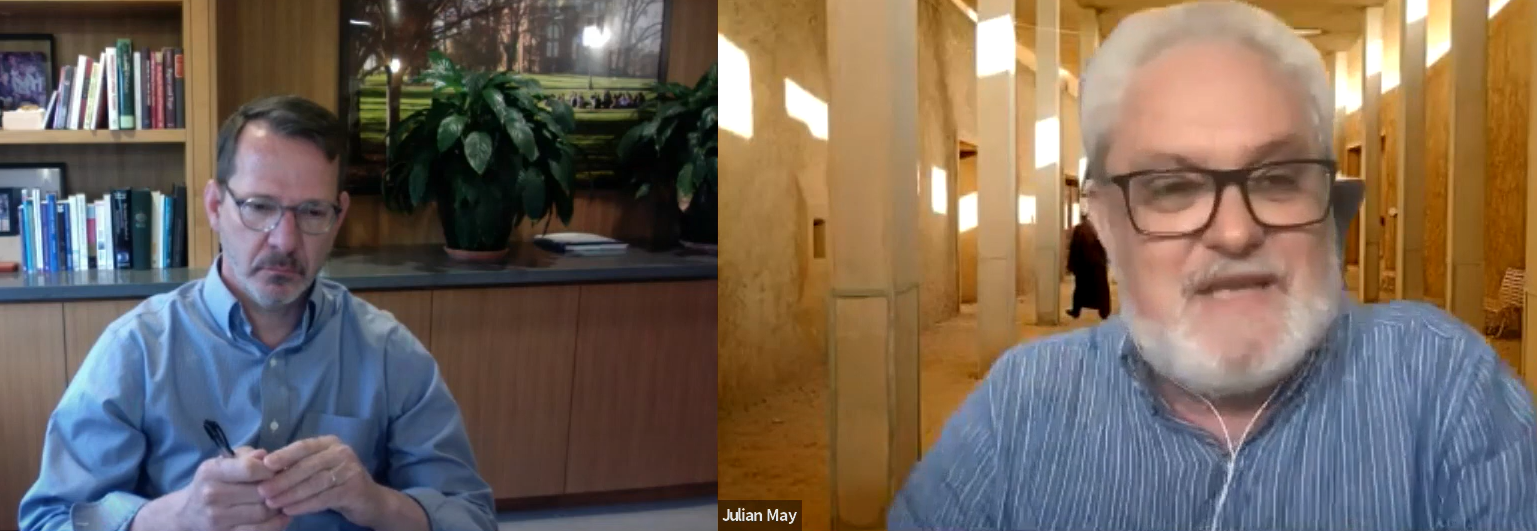The Centre for Food Security joined forces with other UWC centres to host a provocative lecture on the intersections of race, climate change and, yes, food security.

Global ties: Prof Julian May (right) responds to the presentation by Prof Ian Baucom (right) of the University of Virginia at a recent conversation hosted by UWC.
Food security is typically the domain of the social scientists and the natural scientists, with the humanities an afterthought at best.
But as Professor Julian May explained at a recent virtual ‘conversation’, hosted by the University of the Western Cape (UWC) with Professor Ian Baucom of the University of Virginia, the DSI-NRF Centre of Excellence in Food Security has gone out of its way to make sure the humanities disciplines have found a place in the Centre. Most notably it has done so through its support of the university’s Programme in Critical Food Studies, noted May.
To affirm its commitment to exploring the relationship between food studies and the humanities, the CoE-FS teamed up with UWC’s Centre for Humanities Research, a DSI-NRF Flagship centre; the university’s International Office; and the Vice-Chancellor and Rector, Professor Tyrone Pretorius, to present Baucom’s presentation on 12 April.
That presentation, as Baucom explained, was intended as an introduction to his 2020 book, ‘History 4° Celsius: Search for a Method in the Age of the Anthropocene (Theory in Forms)’. In this complex volume, he builds on his own earlier work and that of others to examine the place of the ‘Black Atlantic’ – ie those people of African descent who had been forcibly moved from Africa to Europe, the Caribbean, and the Americas – in the making of the modern world, and attempts to “put black studies into conversation with climate change”. In particular, Baucom draws parallels between the pursuit of financial capital behind both the slave trade and climate change.
“Most broadly, the goal of the book… is to think about the significance of two cycles of accumulation in the making of the modern world,” started Baucom, who is the Buckner W Clay Dean of the College and Graduate School of Arts & Science at the University of Virginia in the US. The first, he explained, is the cycle of capital accumulation and its associations with racial violence, slavery and colonialism across the Black Atlantic from the 17th and 18th centuries to today. The second is the cycle of carbon accumulation over that same period of time – perhaps starting with the invention of the steam engine – and its “uneven” impact on the modern world.
“We see those uneven vulnerabilities mapping almost exactly onto the maps of empire,” he said.
Those themes resonate strongly with the work that UWC is doing in the areas of food security, said May, director of the CoE-FS. Issues of race, the making of a “broken” food system, and “the incredible violence of the food system itself” continue to bedevil food security in South Africa and elsewhere in the world, he added.
What particularly struck a chord with him, noted May, were Baucom’s arguments on the impacts of climate change and racial inequities (and violence) on the future, “which is already here”. This can be illustrated in the high levels of stunting among South Africa’s children, he said.
“By stunting our children, we are indeed immediately impacting upon the future.”
related Articles
Away from the precipice; toward food security as a reality for all
Photo: Ashraf Hendricks/CoE-FS. “Food security at a tipping point; are we heading for ‘Zero Food’?”. That was the question that…
Food Dialogues 2023: Food crisis makes us hungry for solutions
The burning issue of the current food crisis will be top of the agenda at the upcoming, annual Food Dialogues…
New book: “Resilience and Food Security in a Food Systems Context”
Resilience and Food Security in a Food Systems Context is a recently published, open-access resource which delves into why we…



